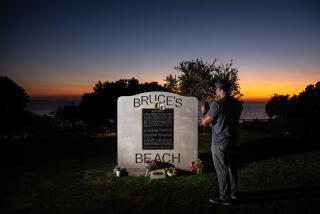The Power of a Simple Apology
- Share via
Disgraced baseball legend Pete Rose, who broke the rules by betting on the game, would not in the end say he was sorry for betraying his teammates and fans.
Similarly, when President Bush first went on television Wednesday to discuss the heinous abuse of Iraqi prisoners by American soldiers and military contractors, he kept coming close to an apology but never quite made one. Perhaps the president thought he had been contrite enough, perhaps he was stonewalling, perhaps he was just following Pete Rose’s lead. But to those to whom it mattered most, his words were insufficient, and they let him know it.
Bush’s studied reticence stood in stark contrast to the remarks of Richard Clarke, who six weeks ago thanked the 9/11 commission for providing “a forum where I can apologize to the loved ones of the victims.”
Clarke’s statement was welcomed by many Americans, but his mea culpa was not emulated by others in the government. In an interview on CBS not long afterward, when Ed Bradley asked Condoleezza Rice whether “families of those people who were killed will hear an apology from you,” Rice waffled and then refused to take up Bradley’s gambit -- lifting a page from Ronald Reagan’s Iran-Contra scrapbook. “Mistakes were made,” Reagan said at that time with decisive vagueness.
Apologizing is hard. Though it is true that a certain kind of apology has become a kind of verbal tic -- no one thinks, for instance, that you are really, truly sorry you didn’t write back sooner -- apologies of substance give us pause. A real apology admits real blame -- indeed, in some states an apology after a traffic accident can be used against you in court as an admission of guilt -- and blame often comes with consequences. For people in positions of power, like politicians, say, or major league baseball players, or anyone who operates under the mistaken assumption that their status in life derives from their infallibility, or that their status in life confers it, the word “sorry,” and the assumption of responsibility it brings, may strike a deeper fear: Offering a public apology may seem to be the fast-track to ceding authority.
But as the experience of President Bush last week shows, failing to offer an apology -- dancing around it -- can look defensive and weak. By Thursday, when this was obvious, the president used a conversation with King Abdullah of Jordan to say the words many had been wanting to hear: “I’m sorry.” Rather than diminishing his authority, Bush’s apology was crucial to reclaiming it.
Although this gesture may seem to be not much more than a rhetorical flourish, in fact it was demanded by the people who were affected most directly -- the victims. They understood, as victims often do, that a restoration of their sense of dignity begins when those people responsible for their suffering acknowledge them -- as individuals, as individuals with histories, as individuals in pain.
That’s why it was so important for the United States to finally apologize to the citizens of Japanese descent whom it interned during World War II, or when Pope John Paul II acknowledged at long last the Catholic Church’s persecution of Jews and Orthodox Christians.
An apology begins to shift the imbalance of power inherent in the relationship between those who have been hurt and those who have hurt them. This is not about shame, though shame may arise. Rather, the person making the apology is recognizing the other person’s humanity, as well as his own. He is admitting that they inhabit a shared community, that they tread the same emotional ground.
In the words of Carole O’Hare, whose mother died on Sept. 11, “when you have people covering their butts, they’re not owning up to being human. People make mistakes.”
A recent study by Jennifer Robbennolt, a University of Missouri law professor, presented people with a hypothetical accident scenario in which they had been injured in an accident with a bicyclist. One group was told the bicyclist would pay their medical expenses but not apologize -- and just over half said they would accept the settlement. Another group was told that the bicyclist was offering both medical expenses and an apology -- and 73% decided to settle.
Similarly, a survey in Britain found that 37% of those who brought medical malpractice suits probably would have desisted if their physician had only apologized to them.
The message here is not that the words “I am sorry” provide a sufficient remedy but, rather, that without them there is less chance of relief.
Sue Halpern is the author, most recently, of “The Book of Hard Things” (Farrar, Strauss & Giroux, 2003).
More to Read
Go beyond the scoreboard
Get the latest on L.A.'s teams in the daily Sports Report newsletter.
You may occasionally receive promotional content from the Los Angeles Times.










